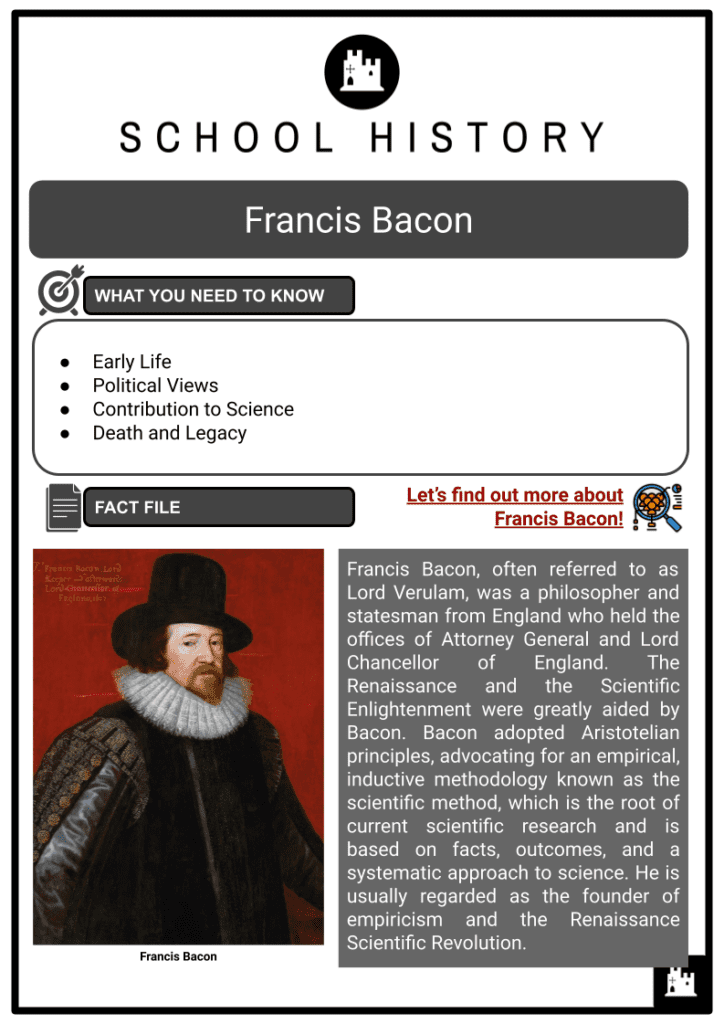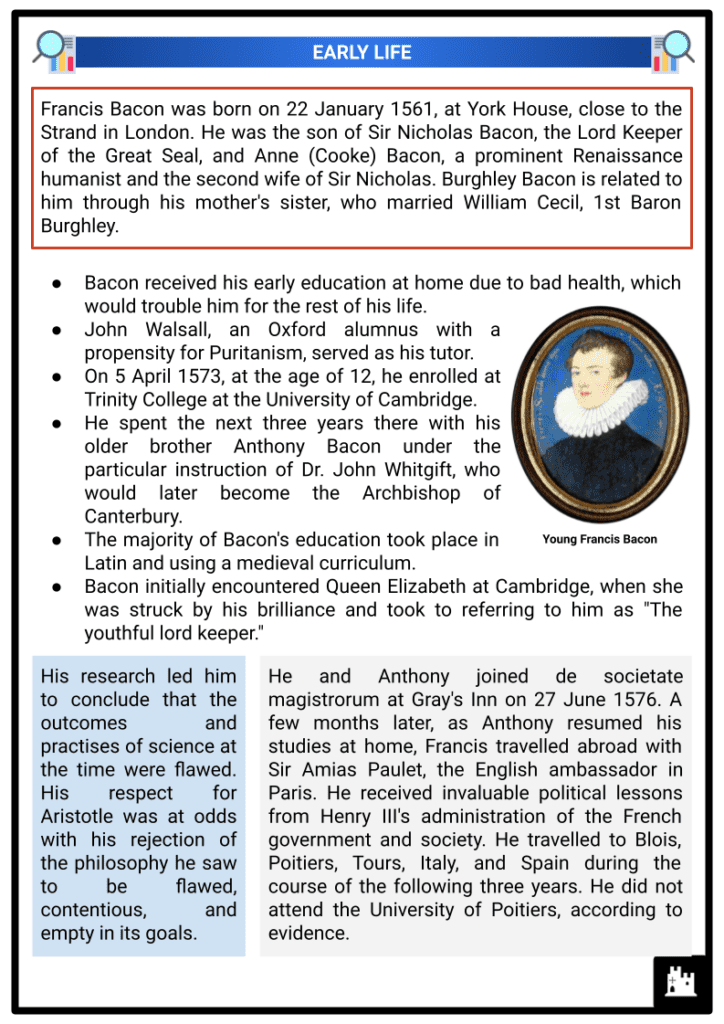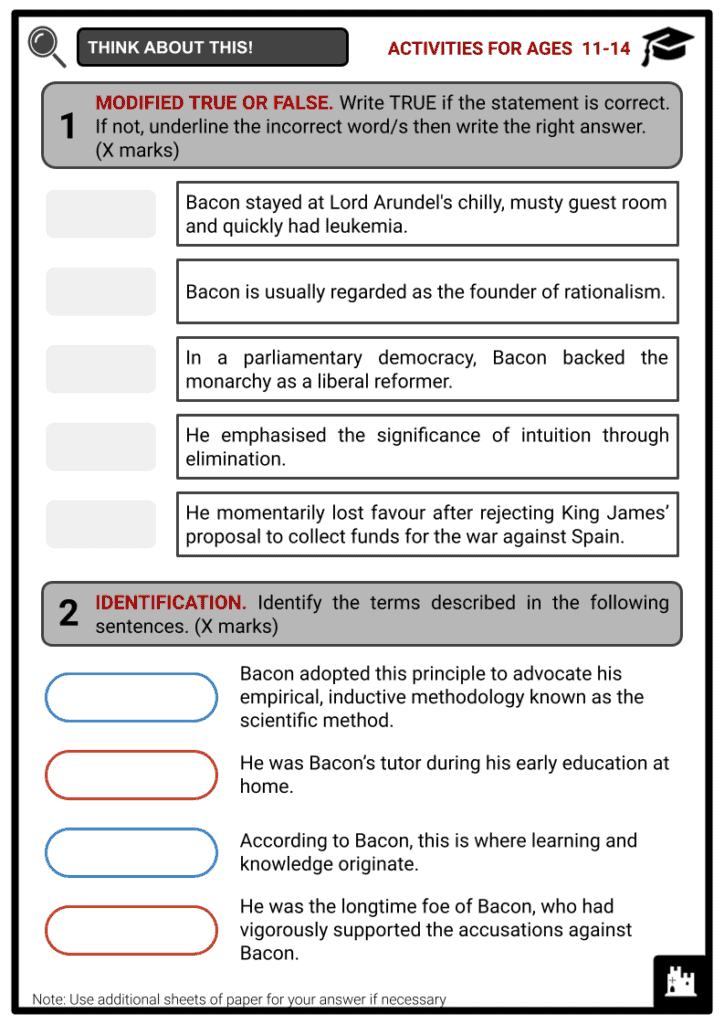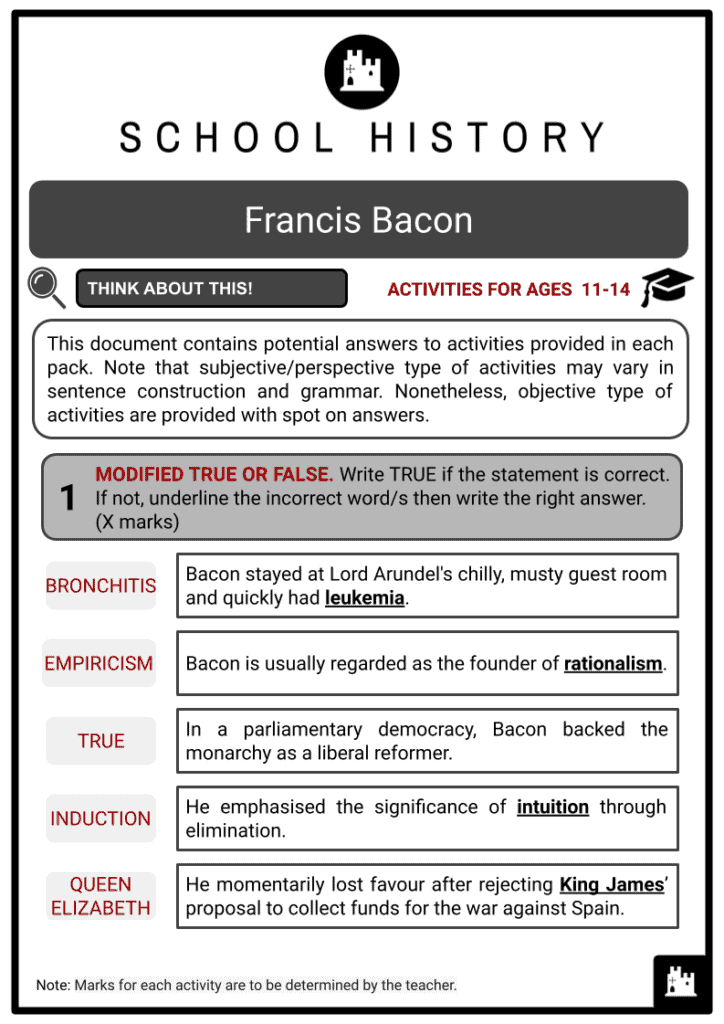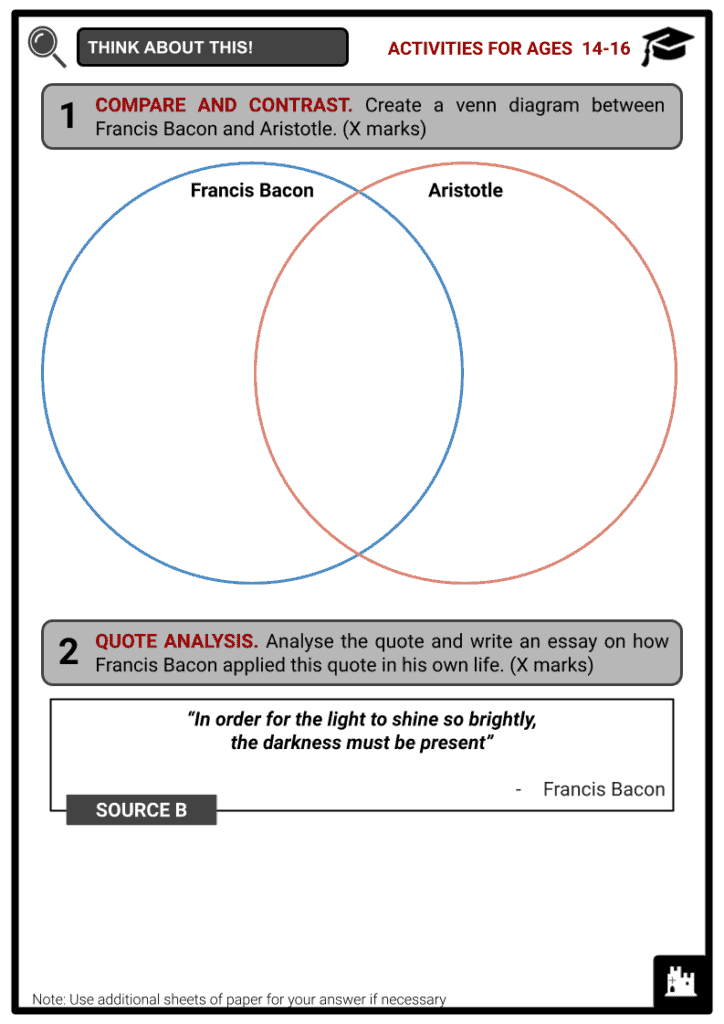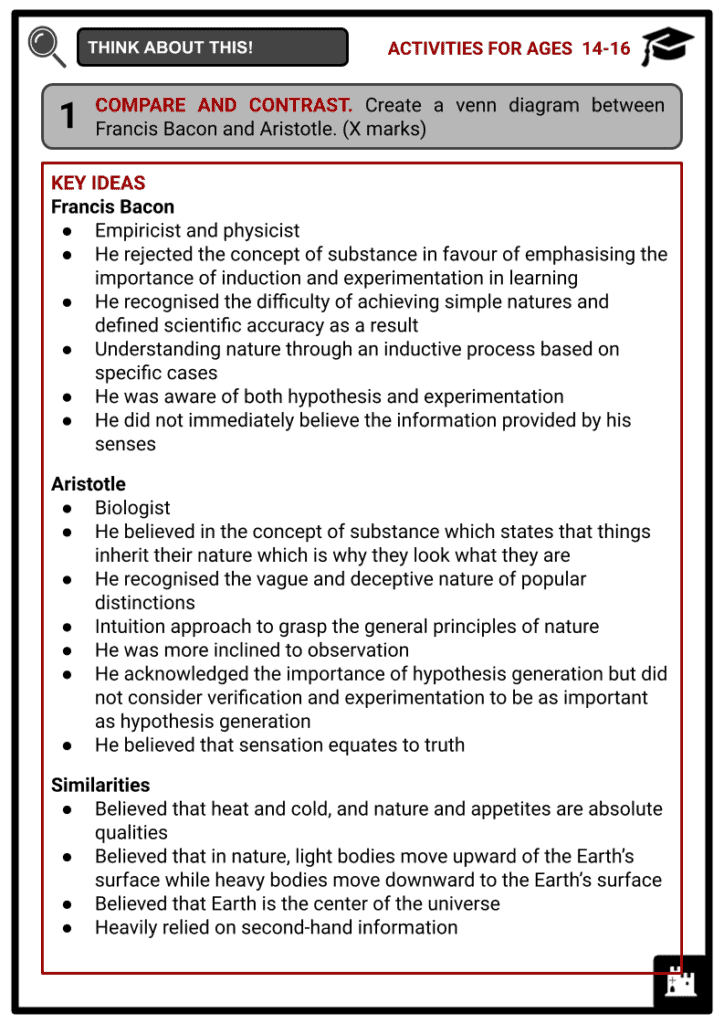Francis Bacon Worksheets
Do you want to save dozens of hours in time? Get your evenings and weekends back? Be able to teach about Francis Bacon to your students?
Our worksheet bundle includes a fact file and printable worksheets and student activities. Perfect for both the classroom and homeschooling!
Summary
- Early Life
- Political Views
- Contribution to Science
- Death and Legacy
Key Facts And Information
Let’s find out more about Francis Bacon!
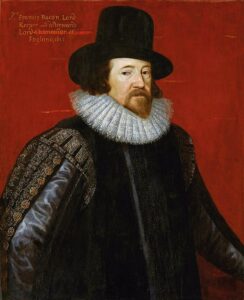
Francis Bacon, often referred to as Lord Verulam, was a philosopher and statesman from England who held the offices of Attorney General and Lord Chancellor of England. The Renaissance and the Scientific Enlightenment were greatly aided by Bacon. Bacon adopted Aristotelian principles, advocating for an empirical, inductive methodology known as the scientific method, which is the root of current scientific research and is based on facts, outcomes, and a systematic approach to science. He is usually regarded as the founder of empiricism and the Renaissance Scientific Revolution.
EARLY LIFE
- Francis Bacon was born on 22 January 1561, at York House, close to the Strand in London. He was the son of Sir Nicholas Bacon, the Lord Keeper of the Great Seal, and Anne (Cooke) Bacon, a prominent Renaissance humanist and the second wife of Sir Nicholas. Burghley Bacon is related to him through his mother's sister, who married William Cecil, 1st Baron Burghley.
- Bacon received his early education at home due to bad health, which would trouble him for the rest of his life.
- John Walsall, an Oxford alumnus with a propensity for Puritanism, served as his tutor.
- On 5 April 1573, at the age of 12, he enrolled at Trinity College at the University of Cambridge.
- He spent the next three years there with his older brother Anthony Bacon under the particular instruction of Dr. John Whitgift, who would later become the Archbishop of Canterbury.
- The majority of Bacon's education took place in Latin and using a medieval curriculum.
- Bacon initially encountered Queen Elizabeth at Cambridge, when she was struck by his brilliance and took to referring to him as "The youthful lord keeper."
- His research led him to conclude that the outcomes and practises of science at the time were flawed. His respect for Aristotle was at odds with his rejection of the philosophy he saw to be flawed, contentious, and empty in its goals.
- He and Anthony joined de societate magistrorum at Gray's Inn on 27 June 1576. A few months later, as Anthony resumed his studies at home, Francis travelled abroad with Sir Amias Paulet, the English ambassador in Paris. He received invaluable political lessons from Henry III's administration of the French government and society. He travelled to Blois, Poitiers, Tours, Italy, and Spain during the course of the following three years. He did not attend the University of Poitiers, according to evidence.
- Bacon performed normal diplomatic duties while studying language, statecraft, and civil law while travelling. He at least once conveyed official correspondence to England on behalf of the queen, Walsingham, Burghley, and Leicester.
- In February 1579, Bacon's father passed away suddenly, prompting Bacon to return to England. Francis was only given a fifth of the money Sir Nicholas had set aside to buy an estate for his youngest son since he passed away before doing so. Bacon incurred debt by borrowing money. In order to sustain himself, he moved into a home at Gray's Inn in 1579. To increase his income, his mother, Lady Anne, granted him a gift of the manor of Marks near Romford in Essex.
POLITICAL VIEWS
- In a parliamentary democracy, Bacon backed the monarchy as a liberal reformer. He advocated for the reform of feudal rules and tolerance of other religions. He was a powerful advocate for the union of Scotland and England as well, which occurred in 1707. He argued in favour of the union on the grounds that a constitutional union would strengthen the economies of the nations and bring them closer together, fostering peace.
- He was elevated to several positions thanks to his quick intelligence and comprehension of the challenges, including Attorney General in 1594. He was also a skilled political operative, prepared to charm and implore those in positions of authority to win their favour.
- He did, however, momentarily lose favour after rejecting Queen Elizabeth's proposal to collect funds for the war against Spain, and he found it difficult to get a job. His poor financial resources eventually caught up with him, and he briefly found himself in custody for unpaid debt. He subsequently won back the Queen's confidence, though, and was a member of the legal team that looked into allegations that the Earl of Essex had plotted to assassinate the monarch.
- Bacon became one of the king's most trusted officials after James I's accession.
- Despite the King and parliament's animosity against him due to the latter's expenditures, he was able to maintain their favour for the most part. In 1618, Bacon was made Baron Verulam and Lord Chancellor, the highest office in the realm.
- Throughout the tumultuous years, Bacon served as the primary go-between for the monarch and parliament. He received the peerage title of Viscount St. Alban by 1621.
- His quick ascent to the pinnacle of British politics, however, abruptly came to a halt before the year's end when he was detained on 23 counts of corruption. In addition to the debt that Bacon had accrued, Sir Edward Coke, a longtime foe of Bacon, had vigorously supported the claims.
- The allegations, according to Bacon, were spread through political espionage. Although he admitted to accepting gifts, he insisted that doing so was common at the time and that it never affected his choice. After a Parliamentary inquiry, he eventually accepted his guilt, possibly in the hopes of receiving a light punishment or perhaps believing that Parliament was determined to bring him to justice no matter what he said.
- However, Parliament had no pity for Bacon and convicted him. Bacon received a £40,000 punishment, a stay in the Tower of London, and a lifetime ban from holding public office. King James freed him from the Tower after a few days there, and his fine was cancelled. But Bacon's public humiliation could not be reversed, and he would never again hold elected office or serve in parliament.
- Bacon responded to his fall from popularity with prolific creative output. He wrote on a variety of subjects, including science, philosophy, law, and Britain's political position.
- Given the context of England in the sixteenth century, Bacon's creative output and originality of thinking were all the more impressive.
- There had been little philosophical research during this time due to the social and political unrest of the day.
- Bacon had a significant role in the English Renaissance, which witnessed a revival of the written word.
- It's interesting to note that Bacon has occasionally been proposed as the true author of William Shakespeare's writings. However, academics do not take this claim very seriously.
CONTRIBUTION TO SCIENCE
- The most significant body of Bacon's work has been in the area of science. Bacon's main goal was to reconsider how people approach science. He disregarded the notions of "innate knowledge" and believed that a scientist's responsibility was to approach all preconceptions with scepticism and to only depend on the actual facts and outcomes of tests. The significance of induction through elimination was emphasised by Bacon. Bacon promoted teamwork as a means of advancing science.
- One of his most important writings, Novum Organum (1620), articulated a new school of reasoning. Bacon favoured the use of reduction and empirical knowledge. It disregarded the older sciences' more "metaphysical" and philosophical approach. To illustrate how a man may be improperly affected by factors like oversimplification, hasty generalisations, or an excessive emphasis on irrelevant linguistic distinctions, Bacon used the metaphor "idol."
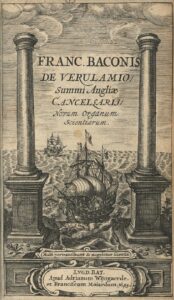
Novum Organum - In the 1630s and 1650s, academicians, especially Sir Thomas Browne, whose encyclopaedia Pseudodoxia Epidemica frequently follows a Baconian approach to its scientific inquiries, were influenced by Bacon's foundational book Novum Organum. The foundation of the scientific method is covered in this book as a process of observation and induction.
- According to Bacon, the foundation of inductive reasoning is where learning and knowledge originate. He proposed that all the knowledge required to properly comprehend a topic could be gained by induction since he believed in experimental encounters. Consider the significance of paying attention to the details in order to reach an inductive conclusion (specific parts of nature).
- The facts of Nature must be discovered via experimentation. An experiment results in pieces of the tested hypothesis being put together to provide a result and conclusion. It is possible to get a comprehension of Nature via this conclusion of details. An inductive conclusion may be reached now that a knowledge of Nature has been attained.
- Bacon described how this process of absorbing the intricacies of nature leads to our developing insight and knowledge.
- Bacon discussed the evidence and proof that are revealed when a single example from nature is expanded into a broad, significant assertion about nature.
- We may learn more about nature and be more certain that things will happen there after we have a better understanding of its specifics, all the while expanding our knowledge and learning new things.
- According to Bacon, induction allows us to better grasp nature as a whole as we learn more about its individual components.
- Bacon came to the conclusion that inductive reasoning is the source of all learning and knowledge.
DEATH AND LEGACY
- Bacon was doing many ice tests in March 1626. He filled a hen with snow at Highgate, England, to test the effects of cold on the preservation and decomposition of flesh, and the fowl got a chill. Bacon stayed at Lord Arundel's London residence because he was ill. Bacon was staying in a chilly, musty guest room. He quickly had bronchitis. Francis Bacon passed away on 9 April 1626, one week after arriving at Lord Arundel's manor.
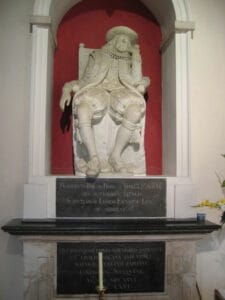
Statue of Francis Bacon - Bacon proposed several changes to English law. Few were recognised by the English legal system during his lifetime. Nevertheless, others believe that after Bacon's passing, his fundamental ideas were absorbed into contemporary legal structures like the Napoleonic Code and contemporary common law. Bacon's attention on the case's facts rather than a rigorous explanation of legal precedent was his biggest contribution. Bacon's desire for the law to focus more on the facts and evidence of the case than obscure legal precedents is similar to his scientific empiricism.
- Following Bacon's passing, his theories started to have a significant impact on the developing discipline of 17th-century European science.
- Bacon's idea of a cooperative research institution was carried out by British scientists in Robert Boyle's group, often known as the "Invisible College," who used it to create the Royal Society of London for Improving Natural Knowledge in 1662.
- The steps of Bacon's revised scientific process were used by the Royal Society, who also adopted his applied science philosophy.
- Institutions of higher learning in science adopted this paradigm.
- Thomas Hobbes, a political philosopher, served as Bacon's final amanuensis.
- Bacon's impact may also be seen in the works of 18th-century encyclopaedians and inductive logicians David Hume and John Mill, as well as the "founder of classic liberalism," John Locke.
- Bacon is still considered as having been a key player in the history of science methodology and natural philosophy throughout the English Renaissance. He is mainly recognised for having ushered in the new early modern period of human understanding by promoting an organised system of acquiring knowledge with a humanitarian purpose in mind.

